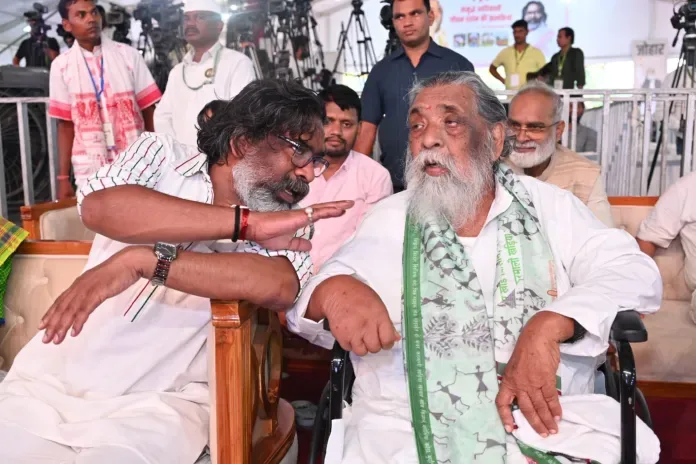The Journey of Adivasi Political Change Makers: Shivcharan, Shibu Soren, and Guruji

In 2019, the Jharkhand assembly elections were already in the works. On a chilly winter morning, I found myself sitting next to the elder Shibu Soren at his residence in Dumka. A large gathering had formed there, transcending caste, creed, and community, eager for their leader to kick off the day's campaign. Once we finished our conversation, Soren rose and wished them success.
A couple of kilometers away, another assembly awaited for a similar purpose: Prime Minister Narendra Modi was scheduled to visit and speak at the election rally. A few days later, Soren's influence proved successful once more. The Jharkhand Mukti Morcha (JMM) took power, shattering all previous records.
Soren's passing marks the conclusion of a significant era in Adivasi national life. He instilled in them a sense of political struggle. Soren was a child of fate. The brutal killing of his father, Sobaran Manjhi, who taught at a school in Gola near Nemra, the town of his ancestry, changed the course of his life. Sobaran resisted the exploitation by moneylenders and ultimately lost his life when Shivcharan, known as Shibu in his youth, was still a young boy.
This event instantly matured Shivcharan. He evolved from Shivcharan to Shibu, then to Guruji, and ultimately Disom Guru, dedicating his efforts to abolishing moneylending, exploitation, and the persecution of Adivasis in the area. As per the legend, Shivcharan vowed not to trim his beard until he avenged his father's death. However, his quest for vengeance went beyond merely eradicating moneylending. This struggle led him into the realm of mainstream politics, which ultimately contributed to the creation of Jharkhand as a separate state in 2000.
After his father was murdered, Soren rallied a group of young individuals and led a movement against moneylenders in his region who imposed exorbitant interest rates on loans. Failing to repay these debts often resulted in moneylenders seizing crops from the lands of tribal farmers. They routinely took over farms and worked them themselves. To protest this egregious behavior, Soren initiated a Dhan katni (harvesting) movement. His supporters gathered the standing crops that had been planted by the moneylenders on the confiscated fields.
Due to the movement's violent nature, many FIRs were filed against Soren. However, the police were never able to apprehend him. In 1972, Soren established the Jharkhand Mukti Morcha, joining forces with prominent communist leaders Binod Bihari Mahato and A.K. Roy.The Jharkhand Mukti Morcha (JMM) was established by him. Nevertheless, he remained a fugitive due to the surveillance by police and his aversion to moneylenders. Soren was regarded as a savior by his community, yet faced disdain from others, including political factions like Congress, which was the dominant party at that time. The tales of Soren's exploits rapidly made their way to the influential circles in both Patna and Delhi. Reports indicated that Prime Minister Indira Gandhi desired for him to be "under control."
K B Saxena, a young officer in the Indian Administrative Service, was assigned to Dhanbad as the deputy commissioner to address the situation involving Soren. However, Saxena soon found that the government's reports on Soren were not completely accurate. Eventually, Saxena met Soren in the dense forests of Tundi, where Soren operated a night school for the local community. He viewed Soren's struggle as valid and encouraged him to turn himself in to the authorities. He even wrote a letter to Mrs. Gandhi to inform her about Soren's life and his struggle. This letter changed the course of Soren's political future. When he surrendered in 1975, the Congress party was keen to collaborate with the JMM, which was led by United Bihar Chief Minister Jagannath Mishra. Mishra arranged a meeting between Soren and Mrs. Gandhi.
Soren became a Member of Parliament in 1980 and quickly positioned himself as the unquestioned leader of the tribal communities that had long sought their independence. However, he has faced numerous allegations of violence, including involvement in the Chirudih massacre, but he was acquitted in all these cases. From 1980 to 2000, Soren spearheaded the campaign for Jharkhand's statehood, working alongside prominent leaders like Atal Behari Vajpayee, LK Advani, Lalu Prasad, and others to achieve his goal of statehood for Jharkhand.
The tribal communities in India will remember Soren for his determination, persistence, and pursuit of political autonomy, while the people of Jharkhand will keep his legacy alive in their collective memory and resilience.